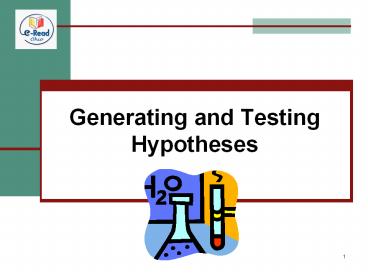Generating and Testing Hypotheses * * * * Quote of the Day
1 / 19
Title:
Generating and Testing Hypotheses * * * * Quote of the Day
Description:
Generating and Testing Hypotheses * * * * Quote of the Day I want children to see themselves not only as inquiring individuals, but as inquiring individuals who ... –
Number of Views:60
Avg rating:3.0/5.0
Title: Generating and Testing Hypotheses * * * * Quote of the Day
1
- Generating and Testing Hypotheses
2
Quote of the Day
- I want children to see themselves not only as
inquiring individuals, but as inquiring
individuals who are part of a diverse community
that inquires, whose members, through their
active participation and diversity of
perspective, contribute to each others
intellectual growth. - Peter Johnston
- Choice Words, 2004
3
Fieldwork Reflection
- What did you experience when using the
- summarizing and/or note-taking strategies in
your classroom? - (Reciprocal Teaching, Rule-Based Summarizing,
Summary Frames, Combination Notes, Cornell Notes,
or Shrinking Notes) - What did you experience when using the
identifying similarities and differences
strategies in your classroom? - (Comparing, Classifying, Creating Analogies,
and/ or Metaphors) - What went well?
- What would you do differently next time?
Celebrate Effort
4
Todays Agenda
- Building Background
- Fieldwork Reflection
- Objectives
- Research Generalizations Classroom Implications
- Deductive and Inductive Reasoning
- Structured Tasks
- -Systems Analysis - Problem Solving -
Historical Investigation - - Invention - Experimental Inquiry - Decision
Making - Seeing the Strategy in Action
- Fieldwork and Evaluation
5
Objectives
After completing this session and its fieldwork,
teacher participants will be able to
- Describe the specific strategies, research
generalizations, and resulting classroom
implications for the generating and testing
hypotheses strategy. - Recognize ways in which they currently use
generating and testing hypotheses as part of
their practice. - Recognize when these instructional strategies are
used appropriately and meaningfully at their
grade-level range. - Assess their own use of generating and testing
hypotheses in their classroom.
6
Quick Write
- How do you currently implement the strategy
Generating and Testing Hypotheses in your
classroom? - How can the information in the textbox concerning
Generating and Testing Hypotheses influence your
use of this instructional strategy in your
classroom?
7
Generalization/Principle Pattern Organizer
(Or Support)
(Or Support)
(Or Support)
8
Deductive Thinking
The Tortoise and the Hare Moral Slow and steady
wins the race
Lion and the Mouse Moral Little friends may
become great friends
The Wolf in Sheeps Clothing Moral Appearances
are often deceiving
9
Inductive Thinking
Goldilocks is drawn to Baby Bears Belongings
10
Deductive Thinking Resource 2
11
Inductive Thinking Resource 2
12
Generating and Testing Hypotheses Jigsaw Activity
13
Six Structured Tasks
- Systems Analysis
- Problem Solving
- Historical Investigation
- Invention
- Experimental Inquiry
- Decision Making
14
Which Structured Task Will Work for You?
- Systems Analysis
- Problem Solving
- Historical Investigation
- Invention
- Experimental Inquiry
- Decision Making
15
Think about
- Why you selected the specific learning task.
- What students will learn as a result of using the
structured learning task.
16
Seeing the Strategy in Action
- High School Science
- 1.Using deductive reasoning to make
- hypotheses
- 2. Generating and communicating hypotheses
- 3. Collecting data to test hypotheses
- 4. Revisiting hypotheses
17
Objectives
After completing this session and its fieldwork,
teacher participants will be able to.
- Describe the specific strategies, research
generalizations, and resulting classroom
implications for the generating and testing
hypotheses strategy. - Recognize ways in which they currently use
generating and testing hypotheses as part of
their practice. - Recognize when these instructional strategies are
used appropriately and meaningfully at their
grade-level range. - Assess their own use of generating and testing
hypotheses in their classroom.
18
Fieldwork
- Are you ready to use a Generating and Testing
Hypotheses strategy in your classroom? - Use one of the six structured tasks
- -Systems Analysis - Problem Solving -
Historical Investigation - - Invention - Experimental Inquiry - Decision
Making - What went well?
- What would you do differently next time?
19
References
- Marzano, R. J. et al. (2001). A Handbook for
Classroom Instruction that Works. Alexandria, VA
Association for Supervision and Curriculum
Development. - Marzano, R. J., Pickering, D. J., and Pollock, J.
E. (2005). Classroom Instruction that Works
Research-based Strategies for Increasing Student
Achievement. Upper Saddle River, NJ Pearson
Education, Inc.































